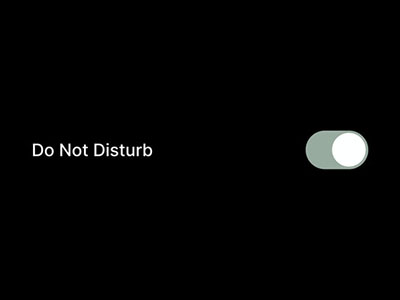
Digital Wellbeing
It is essential to be mindful of your own wellbeing and that of others, especially when you are learning and socialising digitally, as it can be challenging to define boundaries between work and relaxation. Try to create a healthy relationship with technology, where you are in control. Take a look at the tips below to find out how to encourage a healthy work/life balance and cope in a digital world.
A quick guide to taking care of your digital wellbeing
Watch this short video to see how you can help manage your digital wellbeing.

1. Be comfortable
Aim to set up a dedicated work space in a quiet area with minimum distractions. If you can, work from a desk/table with a comfortable chair, rather than being slouched on a sofa. Having the correct posture when using equipment can reduce the risk of injuries like back and neck strain, visual fatigue or repetitive strain injury. For more information, see the be comfortable section of the Digital Wellbeing online course.
2. Avoid overload - take 20
It's important to schedule your working day effectively so you know when you'll be working and when to switch off. This provides structure for your day, helps you manage workload and ensures you have enough breaks, contributing towards a healthier work/life balance. Scheduling regular breaks can help avoid fatigue and other health issues. During these breaks, move away from your work area, stretch your muscles, change your posture and move your eyes to look at different distances. You might want to try the 20-20-20 rule to prevent eye strain - every 20 minutes you've been looking at your screen, look at something at least 20 feet away for 20 seconds. Try using apps like Microsoft Planner and Microsoft Lists to help you get organised and track your work.


3. Be in control
Constant notifications can be distracting, stressful and frustratingly addictive. Consider the notifications you get popping up from apps like Teams, Moodle or Outlook messages. Think about what notification settings you want on your apps and your device that will work for you; and remember to turn off work related notifications when you are not working or on leave. Try to check your email a small number of times throughout the working day so you can concentrate on your to-do list. To take email mastery to the next level, try using Inbox Zero to manage your mailbox. Consider using Viva Insights to set aside focus time during the working day to get stuff done. It's a good idea to discuss working times with your team to help manage expectations of replying to messages outside of their work time or agree to no 'non-essential' communication between certain times, like 7pm-7am, to help maintain a better work/life balance.
4. Get in the right mindset
Have a go at getting yourself into a routine and positive mindset to do your work - you'll feel more motivated and productive. If you're working off campus, you might go for a short walk as a 'commute' to work to prepare yourself for the start of the day and have short, social catch-up meetings with your team regularly to avoid feeling isolated. Try to have shorter, more focused meetings that allow for a quick break before the next one starts, or have a mini break in the middle of longer meetings. Consider turning on your camera when in your video calls - being able to see facial expressions and some body language can reduce meeting fatigue and make the meetings more meaningful and personal.


5. Create a positive online identity
When it comes to apps used for communication and collaboration, always remember there are people on the other side of the screen and we all need to do our part to be kind to each other and make the digital working environment a more positive place. Fostering a positive online identity is an important part of building your reputation. Social media and forums are a positive way for sharing and disseminating research etc. You might want to have separate accounts for work and personal life. It's important to consider what you post and comment online - everything you do forms part of your digital footprint. Aim for a positive and accurate online identity which reflects who you are. Be mindful that social media can portray inaccurate representations of people - as it often presents people 'at their best' and can make others think some people's lives are better than they are.
6. Extra support
Digital technology is part of everyday life and it can affect our entire wellbeing. Although many benefits exist with technology, there are some potential dangers. To learn more, take a look at the Digital Wellbeing online course.

Case studies and formulas accordion
Remote Working and Wellbeing
by Stacey Noble and Cathy Salzedo - Accounting and Finance
Background
Stacey Noble (Teaching Fellow) and Cathy Salzedo (Senior Teaching Fellow) from the Management School were working from home on a significant basis prior to the Covid pandemic. They both work in the Department of Accounting and Finance, where there are large cohorts of students. At the time, Stacey was an Academic Tutor for the part 1 students . Cathy is the Academic Tutor for the placement degree. Before the pandemic, they both commuted to Lancaster University for teaching commitments and found they could do the rest of the work, working remotely from home (or commuting on the train!). Remote student supervision and meetings fit well with the placement degree students.
In this case study they both share their experience and insights on remote working and how they maintain a positive digital wellbeing.
What has changed for you since everyone shifted to online working?
Since everyone moved online life has become easier, in a way. With everyone having access to the right software e.g. Microsoft Teams, it has certainly made it easier to communicate with colleagues and students; students feel like they have more access to us (although we need to control expectations) and we feel more like members of the University than before – having a routine of work, regular contact with colleagues and being able to attend more meetings now that they are all online.
Workload expectations have become less invisible. People acknowledge that it takes longer to prepare for online teaching so are more realistic in their expectations. We work well with administration, having the same conversations as we did in-person, just having to schedule the meetings in advance and have them more regularly. We have nothing but everlasting gratitude to every single team member for adapting to remote working so quickly when the pandemic started and supporting each other ever since.
With remote lectures, we cannot stay after a lecture if students wanted to talk like in-person lectures. It’s valuable to spend some time writing some feedback documentation for after the lecture - which can help mitigate emails from students.
How have you engaged students remotely?
The placement degree students have big challenges – they’ve just finished their second year, they are getting intense workloads on placement and being treated as a graduate already. On top of that, they are also expected to fit in a dissertation. The technology helps the communication – making it easier to keep in touch.
Importantly, we’ve needed to become more informal at times with the students to build up a relationship and trust. We have ongoing conversations whilst on placement - so they know it’s ok to find things difficult, it’s ok to ask stupid questions, it’s ok if you don’t get it right first time, it’s ok to contact us at any time and we will get back to you when we can. We’re also planning to conduct some Dissertation Salons with the students regularly, so they can check in with each other, bounce ideas off each other and get some support from us.
Our online office hours have opened up to a wider group than before – as they don’t have to be on campus to attend. Cathy has found that building up a relationship with the placement students in advance has enabled virtual office hours to be successful – even for those trickier conversations. She is still formal with students when needed, but being informal has encouraged them to open up and share good and bad with her.
What advice can you give other staff on how they can successfully manage remote working whilst maintaining their wellbeing?
- It’s really important to master your diary so you know when your meetings and deadlines are.
- Make sure you have clear start, finish and lunch times and stick to them. It’s key to let people know when you are available.
- Stick to your normal working day so it doesn’t mix into the evening or weekend. You will need a sense of discipline to do this!
- Try following up minor matters discussed in a meeting, during the meeting e.g. forward an email someone needs.
- Build a relationship and trust with the students. They need to know that you aren’t always available but you will get back to them.
- Ensure you have clear communication with people and keep on top of your emails – you don’t want to miss an email from a student. Where needed, give clear guidance for what needs to happen, as early as possible and keep people in the loop.
- If you can, improve your desk space:
- Try to set up your desk space in a lesser used room, so you can leave the area at the end of the day and go spend time with family.
- Position the desk need a window if possible for some natural light.
- Master the technology:
- Keep up with the technology for effective fulfilment of duties.
- Mute notifications on phone at the end of the working day and weekends. This is important so feel like you’ve had a break from work and return refreshed on Monday morning.
- Be part of the community – feel collegiate and not just a member of staff who sometimes goes to campus.
- Have patience in expectations of colleagues and students – some things will take longer, so be patience.
What about the future of remote working, after the pandemic?
We hope that blended roles of working remotely and on-campus in the future will not be seen as a negative, as they might have done in the past and debunk the idea that staff need to be on-campus all the time. We will certainly continue to work remotely, commuting to campus when needed and have a mix of online and in-person office hours to enhance the student experience.

